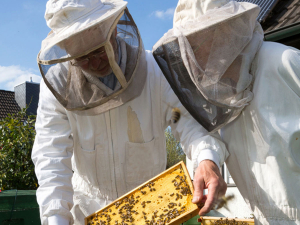Planting to feed the bees
The Ministry for Primary Industries (MPI) have released a handbook offering guidance on how to plant strategically to feed bees.
 Supermarkets have cut the price paid to suppliers, but haven’t cut the price on the shop shelf, claims Lorimer.
Supermarkets have cut the price paid to suppliers, but haven’t cut the price on the shop shelf, claims Lorimer.
Supermarkets have put the squeeze on beekeepers who supply them, claims Jane Lorimer, NZ Beekeeping president.
They have cut the price paid to suppliers, but haven’t cut the price on the shop shelf. So consumers still see honey as really expensive.
“We have cut back but the supermarkets are making more money out of their product. We definitely had the squeeze put on us ‘drop your price or you are out’.”
Head of corporate affairs, Foodstuffs NZ, Antoinette Laird, told Rural News there is currently an over-supply of non-manuka honey varieties in the market which has softened retail prices.
“This is great for shoppers who benefit as honey prices drop - but we do recognise this common supply and demand outcome challenges the supplier community,” she says.
“Last year 500g of Pams Clover Creamed Honey retailed at $12.49 and today costs $6.99 at New World, while Airborne Honey Liquid 500g, which retailed $12.19 in 2019 is now on-shelf at $7.99 – making New Zealand produced honey a very affordable option for more of our customers.”
A Countdown supermarket spokesperson told Rural News the price of honey spiked a couple of years ago and it’s now coming back down due to the changed manuka regulations and an over-supply of clover and blended honeys.
“Our honey prices have dropped about 15% in the last year. Previously the high honey prices meant it was becoming too expensive for customers to choose honey as a spread or ingredient, but we’re starting to see honey sales pick up again now that it’s more affordable for customers.”
The Meat Industry Association of New Zealand (MIA) today announced that Chief Executive Officer Sirma Karapeeva has resigned from the role.
The winners of the 2026 Hawke’s Bay/Wairarapa Dairy Industry Awards were announced at the annual awards dinner held at Copthorne Solway Park in Masterton on Thursday evening.
Environment Southland is welcoming this week’s decision by the Environmental Protection Authority (EPA) to approve the release of Blaptea elguetai, a leaf‑feeding beetle that will help control the highly invasive Chilean flame creeper.
This March, the potato industry is proudly celebrating International Women’s Day on 8 March alongside the International Year of the Woman Farmer, recognising the vital role women play across every part of the sector — from paddocks and packhouses to research, leadership, and innovation.
Fruit trader Seeka posted a record profit and returns to shareholders in 2025.
Recent weather events in the Bay of Plenty, Gisborne/Tairawhiti, and Canterbury have been declared a medium-scale adverse event.